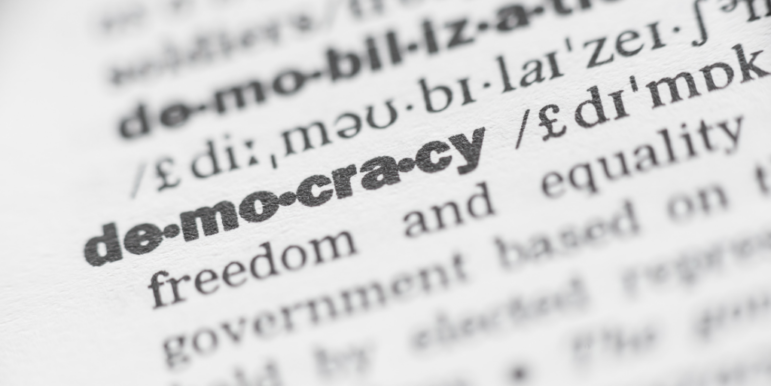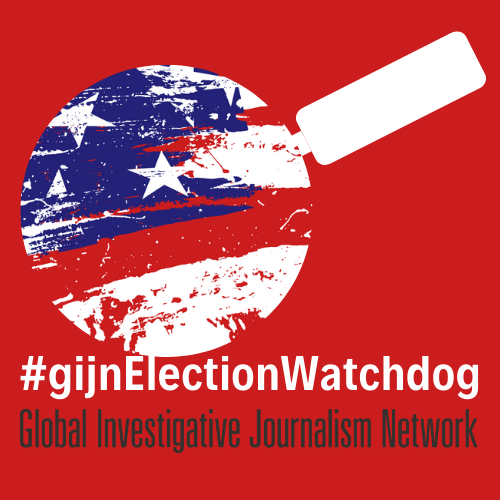

Democracy Really Is on the Ballot, Says GIJN Election Panel
“It’s a mistake to treat this election as if the worst can’t happen.”
This warning to journalists by Miami Herald investigative reporter Sarah Blaskey summed up the grave stakes facing America, and democracy itself, in the months ahead.
In the first of three GIJN webinars focusing on the US 2020 election, Blaskey joined a panel with Pulitzer Prize-winning reporter David Cay Johnston and AP’s race and ethnicity writer Kat Stafford in describing the seismic challenge facing US reporters, and offering key tips on how to tackle, and “land,” the stories that really need telling.
The webinars are running in parallel with the #gijnElectionWatchdog project to arm US reporters with tools to tackle the toughest election reporting challenges.
For Blaskey, a useful approach is for US reporters to cover their own election as if they’re foreign correspondents.
“This idea that bad things can’t happen in this country because there is something inherently democratic about America . . . is extremely dangerous,” she said. “You don’t need to be alarmist about it, but we should prepare as we would covering an election anywhere in the world, if a president there is saying they won’t accept the election results unless they win.”
And Johnston — founder of the nonprofit DCReport.org news service, and author of two books on Donald Trump — didn’t mince words about the “worst” scenario: “What happens if the US — the world’s oldest democracy – ceases to be a free country, and is taken over by a crime family? — a white collar crime family, who don’t shoot people, but who lie, cheat and steal with legal documents and contracts. This is really an election that will decide whether the US will be a free society governed by the rule or law, or a dictatorship.”
For all three panelists, voter suppression — based on false claims about voter fraud, polling station closures, the disenfranchisement of minority voters and threats on intimidation — represents the greatest threat to the election.
Reporters need, first, to avoid amplifying intimidation efforts, says Johnston, by not over-reporting isolated cases of violence or militia vigils at polling stations — and should be sure to report the far more common peaceful voting experiences more broadly.
However, he says investigative reporting on extremist groups — when done with care, and “without sugar-coating” — remains important, and does not necessarily amplify their message. Show their extremism, and their political allegiances, but also highlight the weakness of their reach.
“Writing about extremist groups might help them find some (collaborators) here and there, but writing about them doesn’t really add to their strength, and if you write about them carefully and thoughtfully, you get a lot of revulsion to them,” he said. “You find that law enforcement people follow your every word on this coverage, which is (important). Having armed people outside of the circle of no politicking, which is usually 300 feet from the polling place — those are the issues to look at. But don’t blow it out of proportion.”
Likewise, Stafford — who serves on the board of Investigative Reporters & Editors –suggests that reporters focus on the impact of racism, and the individuals affected by it, rather than the racist messages themselves.
“It’s important to put it out there that these people exist; that they aren’t hiding in dark basements; that they’re dangerous oftentimes,” says Stafford. “But I take issue with profiles on these figures. It’s important to think about who are we giving a platform to in these stories. I’m going to talk about the people most impacted by the racism.”
Given the impact of Covid-19 and the expected high proportion of mail-in ballots expected this season, Blaskey called for reporters to play a key role in reducing the risk of violence or disputes after November 3.
“If it takes a while for ballots to be counted, there could be fear about something being wrong or (nefarious) just because people don’t understand how it’s supposed to work. So writing about how things are supposed to work now will help prevent conspiracy theories after November 3,” she observed.
Here are some of their tips for election coverage:
- Tracking illicit election lobbyists: For key meeting venues closed to the press — such as Trump’s Mar-a-Lago resort in Florida – Blaskey said the “best way I have found” to track informal election lobbyists is to input the venue geocode into Facebook or Twitter, and track who has checked in, who has tagged photos, and what they have posted. Follow this guide to use geocode at full power.
- Transparency: “Work very hard on verification (of evidence), and if you have doubts, express those doubts to your readers or viewers,” noted Johnston.
- Public service reporting: Given the misinformation and disinformation environment, Stafford says the most effective reporting balance is a healthy mix of accountability journalism and stories devoted to informing voters about how to register and vote, and on how the election process works.
- Tackling polarized views: All three panelists said that active listening will be vital in the next month. “For credibility, what we have found works is just listening,” said Blaskey. “Listening to Republican voters also is the way we start building credibility with audiences who might otherwise have called the Miami Herald a left-leaning rag. Also, just understanding why people think it’s raining if it’s not raining is important.”
- Tracking dark money: “OpenSecrets.org will give you all sorts of information on what’s happening with campaign and lobbying money,” said Johnston.
 Rowan Philp is a reporter for GIJN. Rowan was formerly chief reporter for South Africa’s Sunday Times. As a foreign correspondent, he has reported on news, politics, corruption, and conflict from more than two dozen countries around the world.
Rowan Philp is a reporter for GIJN. Rowan was formerly chief reporter for South Africa’s Sunday Times. As a foreign correspondent, he has reported on news, politics, corruption, and conflict from more than two dozen countries around the world.










